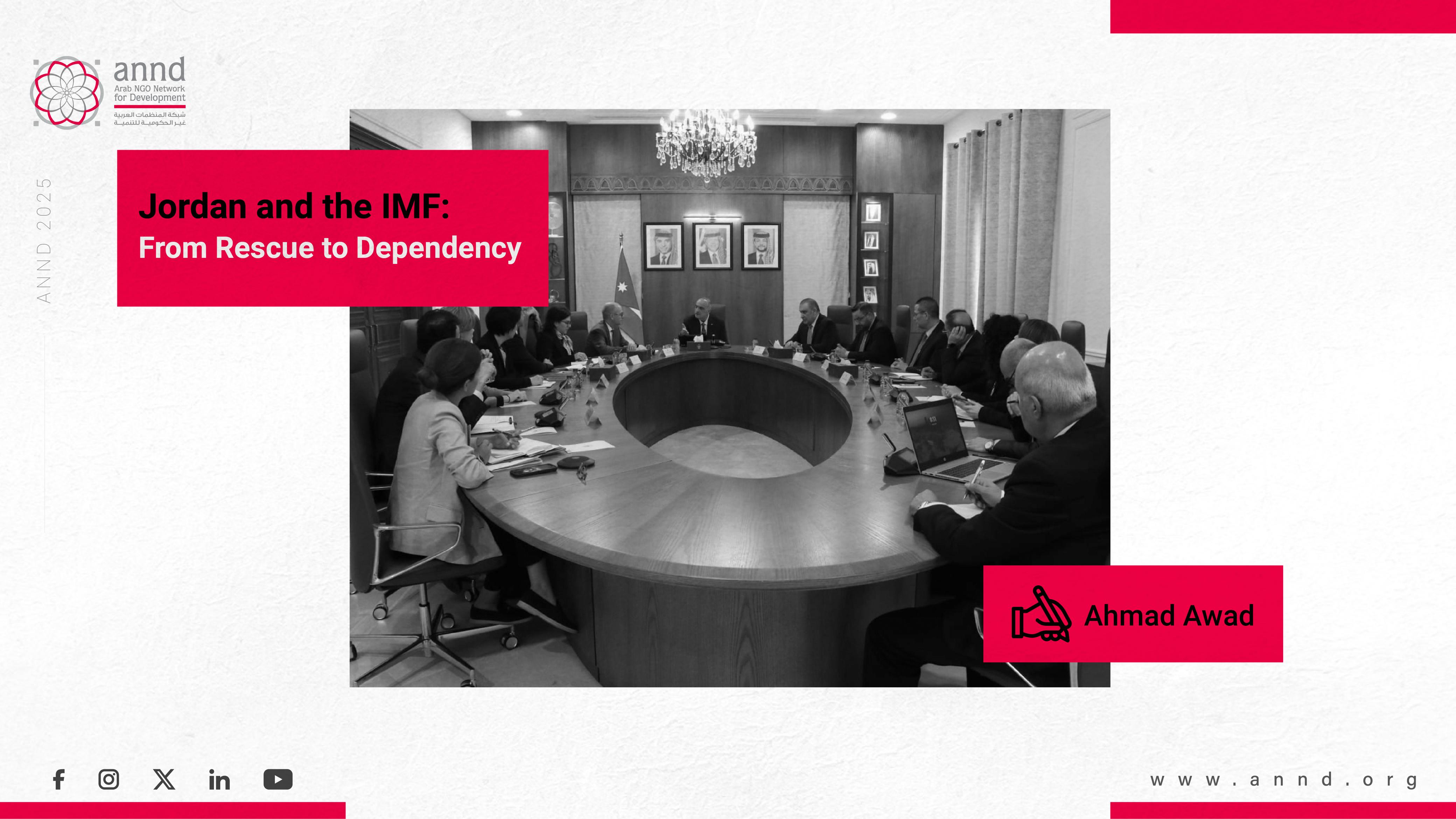
Ahmad Awad

Jordan and the IMF: From Rescue to Dependency -
Ahmad Awad
Since 1989,
cooperation between Jordan and the International Monetary Fund (IMF) has been a
central focus of Jordanian economic policy. This relationship began with a
severe financial crisis, which prompted Jordan to enter into its first-ever
agreement with the IMF, setting itself on a path of structural adjustment and
fiscal discipline. Since then, the country has entered into at least nine
successive programs, which included neoliberal austerity-based political and
fiscal prescriptions under the umbrella of what was known as the
"Washington Consensus."
The stated
goals of these programs were to achieve financial and monetary stability,
reduce the budget deficit, reduce debt, achieve inclusive growth, and reduce
poverty and unemployment. However, experience over more than three decades has
proven that the most notable success of these programs has not gone beyond
enabling Jordan to continue meeting its financial obligations to creditors,
which is the real goal the IMF appears to be focusing on, despite the rhetoric
surrounding financial sustainability and stability.
Since the
beginning of the relationship, Jordan's public debt has increased from
approximately $5.8 billion in 1989 to more than $50 billion in 2024,
representing more than 115 percent of GDP. The budget deficit, before grants,
has remained high, reaching approximately 6 percent of GDP in 2024, according
to data from the Jordanian Ministry of Finance.
IMF programs
have left their mark on various areas of public policy, ranging from reducing
the state's role in providing public services to privatization, and finally to
tax policies that have deepened the burden on the middle and poor classes.
Indirect taxes
(general sales tax, flat taxes, and various fees) now represent approximately
75 percent of total tax revenue, while income tax represents about 4 percent of
GDP. This discrepancy reflects an unfair tax system that burdens consumers,
squeezes the purchasing power of most of society, and weakens aggregate demand
for consumption.
These policies
have contributed to the deterioration of social justice indicators. Poverty
rates rose from 9 percent in 2002 to nearly 24 percent in 2022, according to
the government, and 35 percent according to the World Bank. Unemployment
reached almost 22.0 percent in 2024, with sharp disparities in employment
opportunities between genders and among youth.
Successive
Jordanian governments have often justified their strict adherence to IMF
programs as a condition for accessing international financing from various
sources and for maintaining monetary and political stability. Several
governments have used the rhetoric of "reform" to promote these
programs, despite their repeated failure to achieve their stated objectives.
At the end of
each program, Jordan enters into new negotiations for another. It happened in
2025, when the government decided to renew the agreement for the tenth time,
despite the structural crises plaguing the economy remaining unresolved.
In contrast to
the official position, many political parties and civil society organizations
have adopted a critical discourse regarding this extended relationship with the
IMF, viewing it as an extension of imposed policies that do not consider the
local context and exacerbate crises rather than resolve them. The IMF is facing
increasing criticism for the high degree of "conditionality" in its
programs, which force Jordan to implement harsh tax and austerity policies,
such as raising electricity and fuel prices and liberalizing prices, regardless
of the country's exceptional circumstances.
Civil society
urgently demands that the IMF review its approach and reformulate its policies
in line with the concept of "inclusive growth," which achieves a more
equitable distribution of the fruits of growth and reduces inequality gaps.
It is clear
that IMF interventions and programs have exacerbated social inequality and
pushed towards reducing social protection by weakening labor standards and
old-age insurance within the social security system. They have also weakened
the state's ability to invest in education, health, and transportation, and
continued to pressure wages.
In reality,
despite periods of relative economic growth, this growth has often been
fragile, incomplete, and unable to generate sufficient employment
opportunities. It has not translated into improved living standards, as
unemployment and poverty have continued to rise, and public services have
declined.
While the IMF
advocates for protecting vulnerable groups and inclusive growth, its imposed
policies have led to the opposite. "Reform" measures have contributed
to weak public sector wages and the introduction of flexible labor policies
that have weakened working conditions and undermined a fair working
environment.
Investment in
human capital has also declined. Schools and hospitals suffer from a shortage
of staff and funding, significantly impacting the quality of these services.
Jordan's
experience with the IMF demonstrates that monetary stability does not
necessarily mean inclusive development or financial sustainability. With the
signing of a new agreement, the previous path must be subjected to a frank,
critical assessment, involving the government, experts, and civil society, to
determine a different direction.
Jordan must
demand greater flexibility in the IMF's policies, consistent with its
development priorities. It must also restructure its priorities by enhancing
fair tax revenues, expanding social protection, and developing incentive
policies that boost consumer demand.
Jordan's
continued reliance on borrowing cannot be a permanent solution, especially
since public debt servicing alone now consumes nearly 17 percent of the budget.
Inclusive growth, rising social inequality, stagnant wages, and declining
public services are all indications that the Fund's prescriptions do not align
with Jordan's actual needs.
It is time to shift from the logic of "fiscal balances" to the logic of "economic and social justice" and redefine the relationship with international financial institutions to serve sustainable development and Jordanian society fully.
Disclaimer:
This article was published as part of the newsletter “IMF Policies: No Rule Fits All”. The views and opinions expressed are those of the author and do not necessarily reflect the official position of the Arab NGO Network for Development (ANND).
Recent publications

